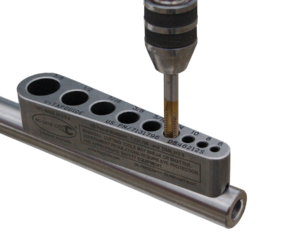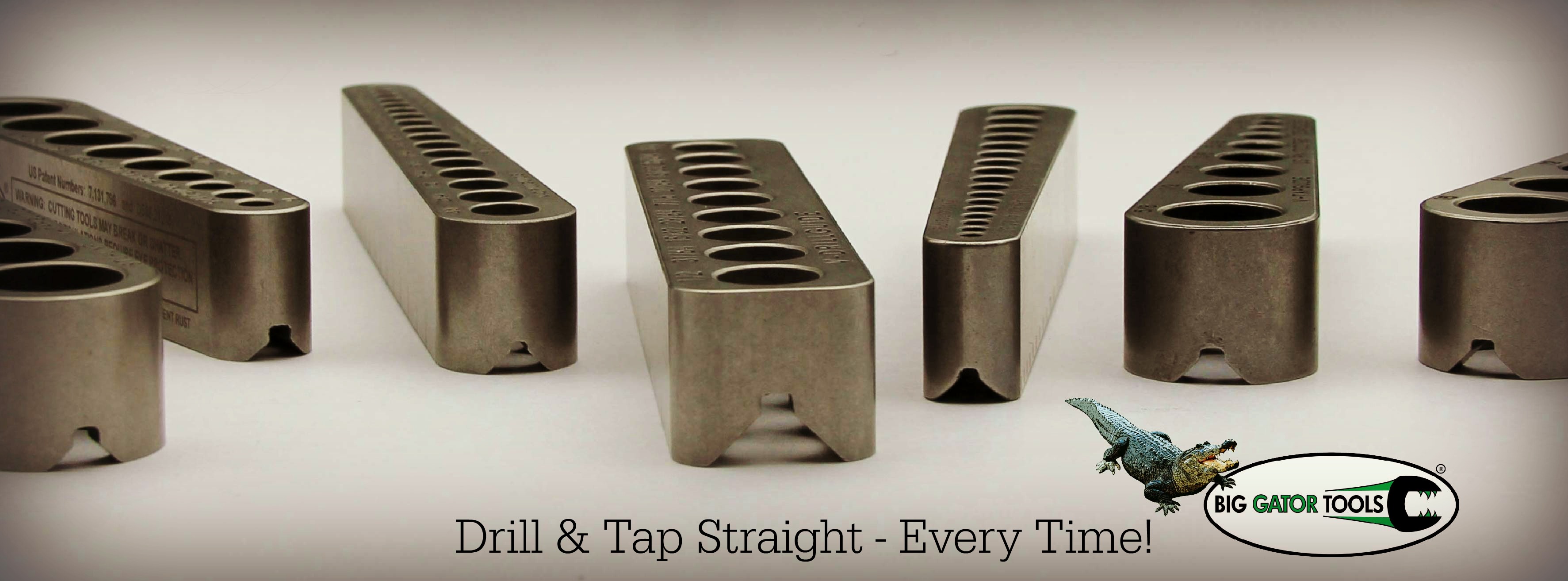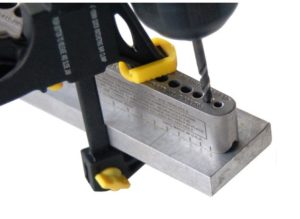What is the difference between a drill guide and a tap guide you might ask? Well, a short, quick answer would be that a drill guide is sized for drill bits, while a tap guide is sized for tap diameters.
Both guides help with drilling/tapping into a hole straight. Taps tend to break easily when started at an angle and drill bits tend to wander off. Let’s go through each one:
Drill Guide:
Our drill guide is a handy tool that’s portable to fit into awkward angles and allows you to drill straight. Drilling straight at times can be challenging or “eyeballing” it just might not work in your project.
The drill guides by Big Gator Tools, called V-DrillGuides come in various sizes. All of them have a Lifetime Warranty and are made from hardened steel throughout the entire guide.
The holes are smooth, unlike drilled or reamed holes. The strength of the steel will not falter with multiple uses and will not dull your drill bits. Use the drill guide on corners and round or flat parts. Time and money will be saved by drilling a hole only once with perfectly aligned holes on wood, plastic, or metal surfaces. All of the drill guides feature a 90° “V-groove” design that runs through the entire guide. This “V-groove” is found on the bottom of the drill guide and ensures perpendicular alignment on round and cornered material. The hole sizes and hole alignment marks are permanently embedded onto the guide to allow quick and explanatory drilling sizes. A drill guide is easy to use: line up your drill guide where you would like your hole, clamp, and drill.
If you have more questions about our V-DrillGuides check out our FAQ page: https://www.biggatortools.com/faqs.
Tap Guide:
A tap guide answers the call to accurately guide hand-tapped threads on the inside of a hole to accept a machine screw or bolt. If you start every hole straight, it will help prevent tap breakage and increase the tap’s life. The tap guide can also be used to restore an internal thread that has been damaged or to cut a new, larger thread in the case of severe damage or stripping.

The tap guides by Big Gator Tools, called V-TapGuides, come in Standard or Metric sizing. There are also STI V-TapGuides (Screw Thread Insert Tap Guides) which are different. More information can be found about the STI V-TapGuides here: https://www.biggatortools.com/v-tapguide-faqs. The V-TapGuide also has the 90° “V-groove” design that runs through the entire guide. This “V-groove” is found on the bottom of the tap guide and ensures perpendicular alignment on round and cornered material.
Similar to the drill guide, the entire tap guide is heat-treated for strength and durability. All tap guides by Big Gator Tools carry a Lifetime Warranty.
The hole sizes are permanently embedded into the guide to allow quick and explanatory tapping. The holes are smooth, unlike drilled or reamed holes. Scrap and re-work are almost eliminated completely when using the Standard V-TapGuide®. The tap guide works great on round parts, angled edges, and flat surfaces.
The standard size tap guide design is easy to use: place the tap guide on a work surface, with the “V-groove” side resting on the surface. Insert the tap through the guide into the pre-drilled hole and turn it clockwise. The tap will then be aligned perpendicularly using the guide as the base; this will ensure a straight and accurately tapped hole. Every few turns, back the tap out counterclockwise to clear the chips. It’s beneficial to hand tap because the tap resistance can be felt and that feeling helps prevent tap breakage. Don’t forget to use a good-quality tapping fluid also when tapping.
You can “Shop” our drill and tap guides at: www.biggatortools.com.
Please let us know if you have any other questions about the difference between a drill guide and a tap guide by Big Gator Tools.



http://carlosperry.over-blog.com Check for the best Forstner bits
so much good information on here, : D.
What kind of tap do I need? As explained in the screw guide , coarse threads are much more common, stronger, less likely to jam during installation (cross thread), and faster to install. So, if you’re deciding between coarse and fine threads for a custom hole, use a coarse thread unless you’re going into sheet metal. If you’re trying to make a hole for an unidentified screw, chances are it’s a coarse thread. Metric coarse threads are in between English coarse and fine threads. Metric fine threads are finer than English fine threads and are rarely used.